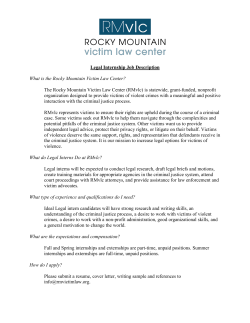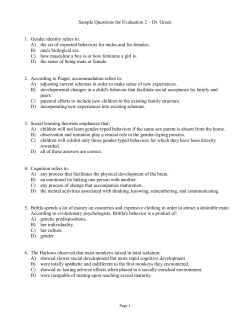
model language - ColoradoPols.com
419 AUL Model Legislation CRIMES AGAINST THE UNBORN CHILD ACT HOUSE/SENATE BILL No. ______ By Representatives/Senators _________________________ Section 1. Title. This Act may be known and cited as the “Crimes Against the Unborn Child Act” [or, alternatively, the “Unborn Victims of Violence Act”]. Section 2. Legislative Findings and Purposes.1 (a) A significant loophole exists in [Insert name of State]’s criminal law, denying protection to pregnant women and certain children. Currently, an offender may not be held criminally responsible for the harm caused to a child unless that child has first been born alive. Thus, an unborn child is completely denied protection under current provisions of this State’s criminal law. (b)[Insert name of State] lags behind most states in this area of crime victims’ protection. Thirty-seven states now provide varying degrees of protection and justice for pregnant women and their unborn children who are victims of violence. Importantly, 28 states provide protection for unborn children at any stage of gestation. (c) Recent statistics demonstrate that domestic abuse and violence against women increases during pregnancy. It is estimated that one in five women will be abused during pregnancy. Moreover, a study in the Journal of the American Medical Association found that, for example, in the State of Maryland, a pregnant woman is more likely to be a victim of a homicide than to die of any other cause. (d) Compounding this tragedy is the loophole in [Insert name of State]’s current law, which denies effective protection and remedy to women, their children, and their extended families, telling them, in effect, that their loved ones never existed at all. When a woman makes a conscious choice to keep her baby and has that choice violently taken away from her by a brutal perpetrator, justice – through comprehensive, effective, and timely legal protections – must be available to them. (e) The federal “Unborn Victims of Violence Act,” enacted in April 2004, is limited, Defending Life 2012 420 applying only to unborn children injured or killed during the course of specified federal crimes of violence. It does not reach many crimes of violence committed against pregnant women and their unborn children – crimes which are most commonly prosecutable only under state criminal laws. (f) Thus, it is the intent of the [Legislature] that the affirmative right of a pregnant woman to carry her child to term be protected, and that perpetrators of crimes against pregnant women and their unborn children be held accountable for their crimes. Section 3. Amendment of State Criminal Code. For purposes of the offenses of homicide, assault, and battery [Designate the specific crimes and sections of the state criminal code to be amended], the term “person” [or other appropriate term(s) as used in the state’s criminal code] includes an unborn child at every stage of gestation from conception until live birth. Section 4. Definitions. For the purposes of this Act only: (a)“Conception” means the fusion of a human spermatozoon with a human ovum. (b)“Gestation” means the time during which a woman carries an unborn child in her womb, from conception to birth. (c)“Unborn child” means the offspring of human beings from conception until birth. Section 5. Exclusions. Nothing in this Act shall apply to an act committed by the mother of an unborn child; to a medical procedure performed by a physician or other licensed medical professional at the request of a mother of an unborn child or the mother’s legal guardian; or to the lawful dispensation or administration of lawfully prescribed medication. Section 6. Right of Intervention. The [Legislature], by joint resolution, may appoint one or more of its members, who sponsored or cosponsored this Act in his or her official capacity, to intervene as a matter of right in any case in which the constitutionality of this law is challenged. Americans United for Life 421 Section 7. Severability. Any provision of this Act held to be invalid or unenforceable by its terms, or as applied to any person or circumstance, shall be construed so as give it the maximum effect permitted by law, unless such holding shall be one of utter invalidity or unenforceability, in which event such provision shall be deemed severable here from and shall not affect the remainder hereof or the application of such provision to other persons not similarly situated or to other, dissimilar circumstances. Section 8. Effective Date. This Act takes effect on [Insert date]. Endnotes 1 Much of the text of the Legislative Findings and Purposes section is modeled after language contained in legislation introduced in New York. See e.g. NY AB 4897 (2009). Defending Life 2012
© Copyright 2024









